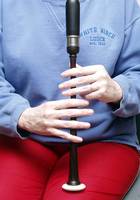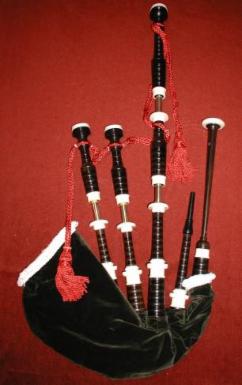PRACTICE CHANTER
Learning the bagpipes does differ slightly from other instruments in that you have to learn the fingering first on a small instrument called a Practice Chanter.
 | The Practice Chanter is often described as being like a Recorder, and it is a bit similar, but differs in that it has a reed inside which creates the sound. It has a total of 8 holes, seven at the front and one at the top on the back. It is necessary to learn on the Practice Chanter as it would be too difficult to master blowing the pipes and learning the fingering simultaneously. |
The first thing that the learner has to master is the scale which is quite easy.
This "Tutor Book" is from The National Piping Centre and I recommend this to all my students.
It takes you through fingering, the scale, gracenotes, simple tunes, more complex tunes, doublings etc etc
 |
TURNING POINT
My "turning point" was when I went on and learned my third tune and it all came together for me. [In other words it started to sound musical!!] Of course everyone is different and some students are quicker learners than others.
BAGPIPES
 | The Bagpipes consist of a bag, a chanter, three drones and a blowstick. The bag acts as a reservoir for the air so that a constant pressure and sound can be maintained. The blowstick has a valve at the end of it to prevent the air coming back out. The drones are configured as two Tenors [the smaller ones] and one Bass [the long one]. Each drone has a single-tongued reed which were traditionally made of cane but are now nearly all made of synthetic materials. Similarly, most pipe-bags are no longer made from traditional materials such as Sheepskin or Cow Hide but are manufactured from low-maintenance materials such as Gortex |
MOVING ON
It is normal to master some of the basics on the practice chanter before moving on to the Bagpipes, but it is only natural that the enthusiastic learner will want to try their pipes as soon as they have them. Most learners will not need pipes until they have been learning on the chanter for 6-12 months.
BAGPIPES
It is essential to purchase a good set of pipes. Do not be persuaded to buy cheap pipes made in Pakistan or similar.
I recommend McCallum Bagpipes in Kilmarnock and most of my students have purchased their pipes from them. The customer service is excellent.
It is tricky to master the blowing of the pipes - holding them for a start - blowing in to the bag - keeping the pressure steady with your arm - I will demonstrate some tricks to master this a little bit at a time so that it does not become such a daunting task
BAGPIPE MAINTENANCE
The Great Highland Bagpipe [to give it it's Sunday name!] is a fickle instrument in terms of it's maintenance.
Most people will testify that there is nothing worse than listening to a badly tuned bagpipe!
The maintenance of the instrument is something that is not frequently taught but is of prime importance.
WHY?
Well, firstly, a well maintained instrument will be easy for the piper to blow. He [or she] will be more relaxed and will therefore look more at ease. They will also be able to concentrate more on playing the melody rather than fighting to keep the bag full of air.
One of the highlights of my teaching career was in Atlanta Georgia. I was teaching at a "Workshop" there. One girl [Lynne Beals] - I remember her name well because of this] told me that she had learned several tunes on her chanter, but had never played a tune right through on the pipes. I asked if I could try her pipes which she agreed to and to my horror I could hardly blow them myself!
I spent about 10 minutes tightening up joints to stop air leaking and adjusted the reeds. She then blew up the pipes and played right through the "High Road to Gairloch".
I had ended her months of frustration with her having wondered if she would ever be able to master this instrument. What had her instructors in the pipe-band she was in been thinking about?
I am very concious of this, as when I was starting out, my father bought me a brand-new set of pipes from a well known and reputable maker. I was still learning the chanter and did not try the pipes for a few months. When I did try them they were absolutely impossible to play! - the joints had all dried up and the reeds were all needing re-hemped and adjusted. I had a sheepskin bag [not so common now] and it was in dire need of seasoning. To make matters even worse the joints where the bag was tied on to the bagpipe stocks were all loose. A garage compressor would have struggled to keep these things going.
The story had a happy ending as my instructors at a College of Piping Summer School fixed them up for me, simultaneously teaching me all about bagpipe maintenance including how to tie in new bags.
Moving on then, and secondly, a well maintained and tuned instrument sounds so much better to the player and the audience!
..............................................................................................................................
BAGPIPE AND PRACTICE CHANTER TUITION
If you would like tuition, or to discuss my services as a Piping Teacher please contact me either by e-mail or telephone.
Please note that all lessons are online at the moment due to the pandemic, so if you require online chanter lessons or online bagpipe lessons please get in touch
Bagpipe and Practice Chanter Tuition/Instruction in Kilmacolm, Bridge of Weir, Houston, Kilbarchan, Brookfield, Port Glasgow, Greenock and West Renfrewshire
I mainly teach at home but will travel if required. Charges are £15/Half Hr., £30/Hr
Overseas Bagpipe and Practice Chanter Tuition
I will also travel overseas if the student is willing to pay my expenses.
Residential Bagpipe and Practice Chanter Tuition
I can provide Residential Tuition utilising local B&B accommodation. I can tailor a Piping Course to suit the individual[s] requirements/standard.
I can also include visits to a bagpipe maker and a bagpipe reed maker.
Having been on residential courses in my younger days I can vouch for how useful and productive they are. I reckon that two weeks residential is worth one year going to an instructor once per week.
A typical day would include :
- One-to-One tuition for hourly intervals, interspersed with your practice sessions
- Bagpipe Maintenance sessions
- Competition technique
- Tea, coffee, meals, refreshments
- Musical sessions
- Field Trips to Bagpipe and Reed makers
Skype Tuition and Lessons for Bagpipes and Practice Chanter
Please see following page for detailsBAGPIPE INSTRUCTION - GENERAL
I am a bagpipe instructor for all ages and stages from beginners to competition pipers - on chanter, pipes and instrument tuning and maintenance.
I am very well versed in competition technique having competed myself for many years and am now on the Solo Piping Adjudicator's Panel and judge solo piping at various contests including the Cowal Highland Gathering.
Please either contact me by e-mail or telephone
tompiperair@gmail.com
07836-543600
BIOGRAPHY
For those who are interested I list the instructors and Pipe-Majors I have had over the years who have helped me in one way or another. There are loads of others - too many to mention, who have aided my piping along the way and my thanks goes to them also.
Bert Kinloch
Duncan McFadyen
Seumas McNeill
Tommy Pearson
Dugald Murdoch
Dugald McIntyre
P/M Robert Hardie
P/M Donald McLeod
Neil McEachern [Islay]
P/M Angus McDonald
Ronald Morrison